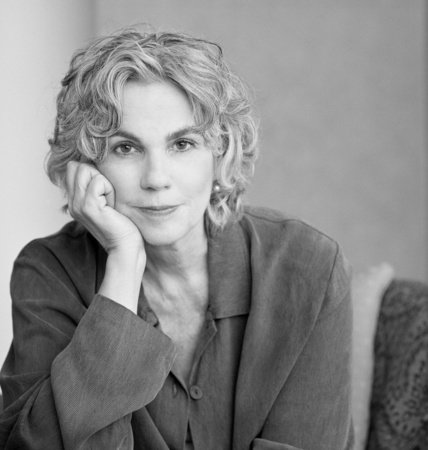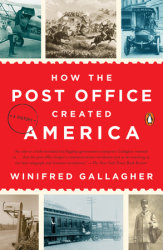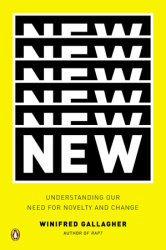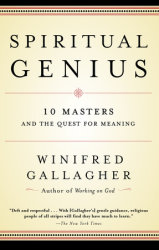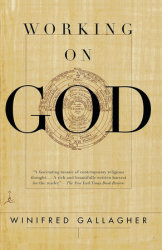Winifred Gallagher’s How the Post Office Created America is the fascinating history of an American institution, how it laid the foundation for our free press, our unique political culture, and much more. In the following interview, we discuss the revolutionary philosophy that inspired the birth of our postal system, some of the famous — and infamous — characters who came to be associated with it, and how it might yet survive the digital age.
PENGUIN RANDOM HOUSE: You’ve written about novelty, handbags, and religion. How did you come to decide it was time to write about the postal system?
WINIFRED GALLAGHER: Most of my work has been in the realm of behavioral science and psychology. I started out at a science magazine. The handbag book was really because I was putting five kids through college. Journalism has generally gone in a specialist direction, I think, which is a shame. I like the old school journalism of John McPhee who wrote about oranges, canoes, rocks, basketball. I think that the journalist should be an everyman who can investigate a subject for all readers. That’s my personal belief, anyway.
In particular, I ended up writing this book because my husband and I started spending half the year in a little cowboy town near Jackson Hole, Wyoming. We spend the rest of our time in New York City, and a number of our commutes were in the car. I drove across the country by myself a couple of times, in addition to going with him.
I was the classic case of the person who has been to the East Coast and Europe, and thought that they were covering the country by going to California once in awhile. I really was that person until about ten or fifteen years ago when I discovered for myself the Rocky Mountains and the West and was knocked out by the beauty there.
We started driving back and forth, and it was dawning on me, belatedly, what absolutely everyone says who does this drive: It’s an enormous country — just enormous — and most of it is still very rural. You have a lot of time when you’re driving alone — just driving across Nebraska takes an entire day — and I started wondering about what connected the two parts of the country. Bear in mind for a very long time the United States was just the East Coast. All of the power and the economy was centered on the east coast, but with the gold rush and Mexican-American war, there was a real need to hook up the two parts of the country. How were you going to do this? It wasn’t just a military conquest or politics: Something had to hook up those two parts of the country.
One night I was sitting out on our porch in Wyoming having a drink with my husband and I literally jumped out of my chair and said, “The post office created America.” That’s how I came up with the idea. I called my editor and we had already signed a contract for me to do a book on a completely different subject and I said, “I hope you’re sitting down because I have this idea.” I told her, and she said that she would think about it and talk with some people. We talked the next day, and I started this book.
PRH: I was surprised to learn that the postal system had existed in one form or another since before the Declaration of Independence.
WG: Sure. When we were a colony of England, the Crown had established a very rudimentary post office. In fact, Benjamin Franklin, for most of his career, was an employee of the Crown’s postal system. We think of him as our first postmaster, but he was that for only a very short period of time. For a long time — decades — he was a big official in the Crown’s government system as one of two assistant postmasters general for the northern colonies. It was a big job.
The real difference between the Crown’s system and our system didn’t really set in until 1792. The system that Franklin ran for the United States was very much the same system that he ran for the Crown. It was concentrated on the east coast and the cities where it would be able to mostly pay for itself. You have to bear in mind that people didn’t get letters until the 1850s. They were too expensive. They cost a fortune. The only people who sent letters were businessmen, lawyers, and government officials who had the franking privilege, so their mail was free. The average person got fewer than one letter a year. Franklin ran the system on the east coast where the business people who could pay for it were concentrated.
When things really became distinctly American was in 1792, when Dr. Benjamin Rush, George Washington, and James Madison in particular, wanted to have a very radical post system that would create an informed electorate. Their principle was that if a government for, by, and of the people were to operate — and that was a very iffy proposition in and of itself — then the people had to know what was going on. Otherwise, how could they vote?
They decided the best way to do that was to subsidize the circulation of newspapers to everyone in the population. Bear in mind, the population was already spreading west into Ohio. Ohio was the Wild West of their day. That was a very ambitious thing: How were you going to get these newspapers to all of these people? There were no roads, and our transportation systems were very sketchy. Most roads in the country you couldn’t even begin to get a wheeled vehicle on. You had to walk or go on horseback. They decided they were going to do it anyway.
Washington was very preoccupied through both terms of his presidency with unifying the country. He kept saying in his letters and to his colleagues that he didn’t know how they were going to keep this big, spread-out country connected. How will they keep the people all feeling like Americans? A lot of the continent was still claimed by European powers.
They decided to go ahead with this very ambitious scheme for the post office. It basically subsidized the publishing industry because the big restraint if you wanted to be a publisher was getting the papers to the people. The government came in and said that they’d get them to the people for very little money. This caused an enormous explosion in the publishing industry. All of a sudden we had this very vibrant newspaper industry that created a very vital but contentious political culture that was distinctly American. We see it going on now, but it actually goes back to the Founding Fathers who ensured that this would happen because they wanted people to have access to uncensored ideas and opinions, and they wanted people to debate. You get both the positives and negatives with that kind of situation, but really, that’s what made the American post office distinctly American: It was set up to give people information, not just give rich people letters.
PRH: Did the mail encourage regular people to become more involved in this dialogue? Did everyone think that was a good thing, or were there people who didn’t like it?
WG: Both are true. When de Tocqueville came here in 1831, he traveled by stagecoach, which was often the mail coach because the government subsidized transportation contractors to carry the mail. He was astounded that he could go into the Michigan outback and people would be talking about current events not just in this country, but in Europe. America was still very wet behind the ears, and we already had five times the post offices of France, and twice as many as England. That’s really astounding. It was really the post office that put us on track to being a global information superpower. That’s why we’re the culture we are today: because of the decision to create the postal system.
PRH: I’m sure there were people who regretted this. Didn’t the English king want to keep the colonies from having a local press?
WG: It was considered outrageous, the idea that the people should know what was going on. For the elite, that was a heretical idea all over Europe and not just England. In Europe, the authorities just told people what they were allowed to know. The kings, the popes, and the aristocrats were the only ones who got mail. They, in turn, decided what the people were going to hear. It was a very wild idea, and lots of foreign visitors who came here were shocked. They were shocked by the very rowdy tone of our press, and they thought that our newspapers were priced too low because it encouraged average people to learn what was going on. They were also concerned that it encouraged the press to cater to the “low tastes” of these presumably lower class people. It was very, very controversial.
PRH: What would an election year have looked like back then?
WG: You’re talking about 240 years of history, but let’s go back to the Founders. The newspapers very rapidly became partisan. Washington had this idea that he didn’t wants us to be partisan. He didn’t want us to be in all of these different parties: He wanted us to be Americans. That didn’t last fifteen minutes from all that I could tell. It very rapidly divided into the two parties that have gone through various changes over time but are similar to what we have today: a Federalist party that believes in a strong federal government, an economy, and business, and another party that was more agrarian, more centered in the south, and very suspicious of business and a powerful federal government. These differences were right there with the Founders, and the newspapers became the loudspeakers for the two parties. They were very biased. They wrote very heated opinion pieces, they slanted the news. They called their political opponents on the other side things like “maniacal pedants” and “prostitute wretch:” all kinds of really wild stuff. They made Donald Trump look mild by comparison. Even Washington was criticized. Poor John Adams was called old, toothless, and feeble-minded: all kinds of things that are hard to imagine today.
PRH: I don’t know if that’s so hard to imagine today!
WG: We’re kind of getting back into that, but there’s nothing new about it. Much the same thing went on with Andrew Jackson. He was a very polarizing figure, of course, and during his presidency, politics became very partisan and some of his opponents looked down their noses at this wild, southern frontiersman and called him “Andrew Jackass.” Jackson was such a masterful politician that he embraced the term, and that’s why the donkey is the symbol of the Democratic Party.
PRH: The postal service offered opportunities for African Americans and women, right?
WG: It was the first institution that gave those disenfranchised groups positions in the public sphere. This was huge. Imagine: Women couldn’t vote, but a few women came to be named postmasters. That was a very prestigious federal job. It’s hard to imagine how that would have happened. There were not a lot of them, but there were some of them throughout the history of the post office.
As the country changed, more and more women were allowed to have different kinds of positions in the post office. Wars allowed more women to work at the post office because there simply weren’t enough men to do the jobs. Women got something of a break during the Revolutionary War and quite a big break during the Civil War. Montgomery Blair, Lincoln’s very brilliant Postmaster General, employed women as clerks in the postal headquarters in Washington, DC. It was a very big deal. Being a clerk meant that you were literate, you had responsibilities; it was a white collar job. That was unusual. Around the same time that the western expansion was going on, for similar reasons there weren’t enough men around to do the job, so there were more opportunities for women to be postmasters in rural communities and to even start carrying the mail.
PRH: There was a historical character in the book that I’d love to hear about. She smoked cigars, rode a stagecoach…
WG: Ah, yes. Stagecoach Mary Fields. She was a fascinating character. She had been enslaved in the south and then taken in by an order of nuns who employed her and gave her a home. They moved to the Montana territory to start a mission school and brought Mary with them. She was six-feet tall, she was a crack shot, and she was as strong as any man. She was a jack of all trades, too, and got into considerable amount of trouble. She liked to have a drink and enjoyed going to bars and getting into fights and things. The bishop of the area censured her, and the nuns bought her a wagon, a horse, and set her up with a postal contract. She delivered the mail for about ten years in the Montana territory. She was a very popular figure. When she died, she got headlines in both of the area’s papers. She liked to have a drink and get into arguments, but she was also famous for buying candy for kids. She was a very interesting character and she was a postal contractor.
PRH: Even today postal workers have an intimate connection with the people on their routes. We see them all of the time.
WG: Absolutely, sure. They’re very popular. People might grouse, especially in the cities, about a big urban post office — about having to wait in line or whatever—but as soon as you go even into the suburbs, no less rural areas, the post office becomes much more like the way it was back in the early part of our history. It was a community center. People congregated there to share their news, share their letters. The postmaster often knew everyone’s business in town and would share that information judiciously, or not. The same was true for letter carriers. In rural areas, they became the people who could tell their customers what was going on, kept an eye out for trouble, or someone who was sick, or being flooded, or facing another natural disaster. They became communication agents throughout the country.
That’s one of the issues when people say something must be done about the post office: It’s hard to say what because the post office covers everyone from Key West, Florida, to Barrow, Alaska, and it means different things in different parts of America. It means something different for businesses than it does for private customers. It means something different for the elderly, for whom it may be their only connection with the outside world and how they get all of their medications, than for a young person who is always on the internet. It means something different for the rich and the poor, the rural and the urban. It’s a very big, shaggy beast that has to do a lot of different jobs for a lot of different people.
PRH: Some people say the post office is doomed for extinction in the digital age, no matter what. Can it stay relevant?
WG: The reports of the post office’s death have been greatly exaggerated. The post office is a $68.5 billion a year industry, it delivers forty percent of the world’s mail, and it is a linchpin of our business community. It is not going anywhere soon, or probably ever, in my opinion. I think there are three different options for the post office. There are people who would like to privatize it, but that’s not wildly popular. That’s more of something to say in op-eds and that sort of thing. It sounds good, but neither FedEx or UPS could possibly handle the volume of mail the post office does, and they would risk bankruptcy if they tried.
Moreover, people don’t realize that the post office, UPS, and FedEx are not competitors anymore: They are cooperating entities. I don’t think it’s going to be privatized. You could say that the government could retrofit the post office for the digital age. The post office did make a terrible blunder back in the eighties. It could have gone digital. There were people in congress and people in postal management who saw that it should go digital — that email was the logical extension of paper mail — but for various complicated political reasons, it never happened. It’s possible. They could decide they want to go digital and they could give us all digital addresses the way they gave us physical ones. They could give us broadband access. I don’t understand why every post office in America doesn’t have a bank of computers so that people can come in and go online like they do in libraries. There’s postal banking. There are all of these things that could happen, but these are political decisions, and right now, in a center-right country where it’s hard to get the government to spend on anything, it seems unlikely that is going to happen.
The third alternative would be to pare it back to a delivery system for profitable services. They’re making a lot of money on parcels. The volume of parcels rose by fifty percent between 2010 and 2015. It’s a big asset for any country to have a physical delivery system, and we have a really phenomenal one. We have 32,000 branches of the federal government spread throughout the country. We have this delivery system that could be an enormous help in some kind of emergency. It is possible that you could pare down the things that aren’t paying for themselves, and have more things that do pay for themselves like parcel delivery. That would preserve the postal system as the nation’s hardcopy delivery system. That, I think, is the most likely thing to happen: that it will age gracefully and downsize because it missed the opportunity to be our digital system.
